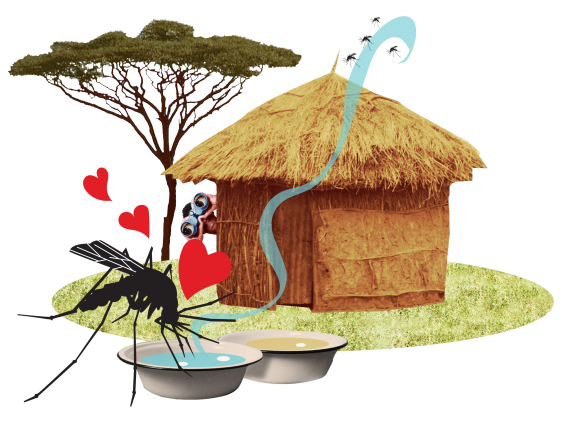Tekst: Nicole van ‘t Wout Hofland
Mwingira’s method of fighting malaria targets female mosquitoes and their eggs. Female mosquitoes choose a site for laying their eggs very carefully, on the basis of smell. Mwingira succeeded in identifying the smell that attracts the mosquitoes and using it to lure them to lay their eggs on a site covered in pesticide. ‘Then the larvae don’t hatch out and we can control the larvae population,’ says Mwingira’s supervisor Willem Takken, professor of Entomology.
Beating back the carrier
Malaria mosquitoes spread a parasite that causes the disease malaria. Globally, more than 400,000 people die of malaria every year. Scientists expect this number to go up as a result of climate change and the malaria parasite’s growing resistance to current treatments. So beating back the disease vector, the malaria mosquito, could be the solution.
A female mosquito lays her eggs in water and the way it smells tells her whether a site is safe and suitable. Mwingira discovered that a site where there are already other mosquito eggs or young larvae is attractive. Young larvae emit a certain attractive odour that lures the mosquitoes. The odour of adult larvae (five days old), by contrast, repels female mosquitoes. ‘That is because adult larvae eat the young ones,’ explains Takken. ‘So no mother wants to lay her eggs there.’
Attractants
Mwingira identified the odour ingredients in the laboratory. He raised mosquito larvae in a sterile tub of water containing fish feed. Using absorbent material Mwingira obtained the odours produced and identified their chemical composition. That turned out to consist of well-known, commercially available chemicals. A behaviour study of mosquitoes in captivity in a laboratory proved that they responded to the chemical odour. ‘With that we demonstrated for the first time that these insects respond to this substance,’ says Takken. Mwingira then travelled to Tanzania for a field study. He created a mosquito breeding site with tubs of water in a village where there were a lot of malaria mosquitoes. Some tubs contained the attractant odour and others the repellent odour of adult larvae. As expected, the mosquitoes laid their eggs in the tubs with the attractant odour and avoided the tubs with the repellent odour.
In a follow-up study, Mwingira added an organic pesticide to the tubs of water with attractant odours. ‘We saw that the mosquitoes still laid their eggs in the water with the bait in it, even when it also contained pesticide,’ says Takken. The first results from the field trial in Tanzania are hopeful. ‘Now it is important to start a follow-up study in a larger area,’ says Takken. ‘Then we can measure whether the mosquito population actually declines.’
Victor Mwingira is due to receive his PhD while in Tanzania, in a Skype call on 19 May. His supervisors are professors of Entomology Willem Takken and Marcel Dicke.

